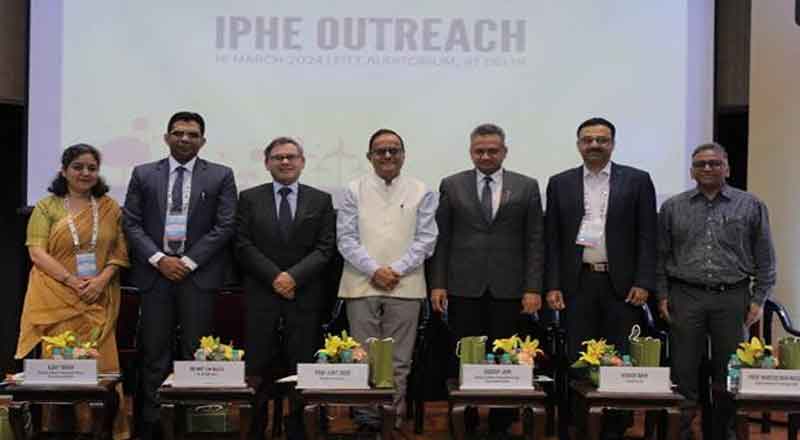Dr. Bhaskar Chatterjee, DG – Indian institute of corporate affairs (IICA) has been an influential figure in the drafting of the CSR Act, 2014 and is termed by many as the Father of Indian CSR. He is retiring next month and in an interview with SPOI, the outgoing Director gives an idea of how the current state of CSR is in India and how this can be upgraded and the process accelerated in order for the goal to be met –
A retired IAS officer, Dr. Bhaskar Chatterjee’s current role is the logical followup to the last post he held, as secretary of the department of public enterprises (DPE). He was instrumental in framing and issuing the CSR guidelines for Public Sector Enterprises (PSEs) in April, 2010. Thereafter, he played a major role in the inclusion of Section 135 in the Companies Act of 2013 and in the framing of the rules thereafter. Today, as the DG & CEO of the Indian Institute of Corporate Affairs (IICA), he spearheads the National Foundation for Corporate Social Responsibility (NFCSR).
From a global standpoint, where does India stand in terms of CSR growth?
The way I see India’s development model, is for us to ensure the upliftment of the weaker sections and the mainstreaming of all those in our society who have been kept out of this mainstream for such a long period. CSR to my mind is an instrumentality; it is the means by which we can help to bring the marginalised, the poor, the isolated into the mainstream of our development process. This can happen because for the first time, India’s vision for having a CSR law or of having a specific section in the Company’s Act dealing with CSR allows corporates to use a small part of their projects in accelerating India’s development. In a word, it is not as though the Government will step back but their primary duty to ensure the poor get the aid remains true and firm. But what will now happen is that corporate money, corporate genius, corporate ability to innovate, corporates’ quick response time will ensure that projects specifically intended for the upliftment of the poor actually get done better. Also at the same time, they would synergize with complementing and supplementing the impact these projects will have on the society. This is broadly the holistic vision of making sure that the corporate and the government are together hand in hand and shoulder to shoulder to ensure that our upliftment process is accelerated. This model is unique by itself, nowhere tried on the globe. We hope that we will in the near future become the benchmark for all other nations in this planet.
Since you have been involved with evolution of CSR activities, what is the need of the hour according to you for India to evolve a robust CSR framework?
The need of the hour has actually 3-4 important components – firstly we should break the trust deficit between the implementation agencies, namely the NGOs, the Trusts, the not-for-profit companies and the corporate entities. The success of our CSR programs will depend on how these components work together. When this actually happens, there will be an important role for the government also to play. As a general overseer, the govt. in different ministries has to try and facilitate this process. We in IICA also have a very substantial role; we tend to look at the national picture, try and present those items to the government where perhaps policy interventions are necessary. And then of course we need to engage with the communities at the grass root level. When we try and implement a programme of this magnitude, the engagement of our beneficiaries at the grass roots is essential for the success of the program. In my vision therefore, the need of the hour is the holistic vision from the government, the bridging of the trust deficit and ensuring that communities at the grass root level are fully involved in what we do with, by and for them.
What message would you like to give to the companies to run a successful CSR campaign?
First of all to believe in CSR and not to pay just a lip service. To understand that now we have moved away from the old ideas of writing cheques and doing philanthropy. We have moved into the area of strategic CSR. The vision of implementing projects goes right down at the ground level and then not only believing in the fact that now they are partners with the government in the development process, but believing that engagement with the communities working with implementation agencies imparts to them a very rare opportunity. Utilising the profits that they have made, the small proportion of it, ensuring that the work gets done, monitoring carefully and at the end being true to their conscience by evaluating what they do objectively, so that we live together a permanent imprint on the ground. The impact of what we do must be visible and lasting. Only then CSR would be more meaningful.
Lastly, to make CSR programs a success, do you think there should be adequate skilling and grooming of young talents in India?
Without doubt, the fact is that we should engage the youth of the country. Unless we bring them onboard as the leaders of tomorrow our goal of giving India a successful CSR agenda would not be met. At the same time we should convert the education system of the country into employable skills, in making them an integral part of this development process. Working with them, bringing them into the ambit of what we do, will ensure a great future not only for the country but for the future generation too.




